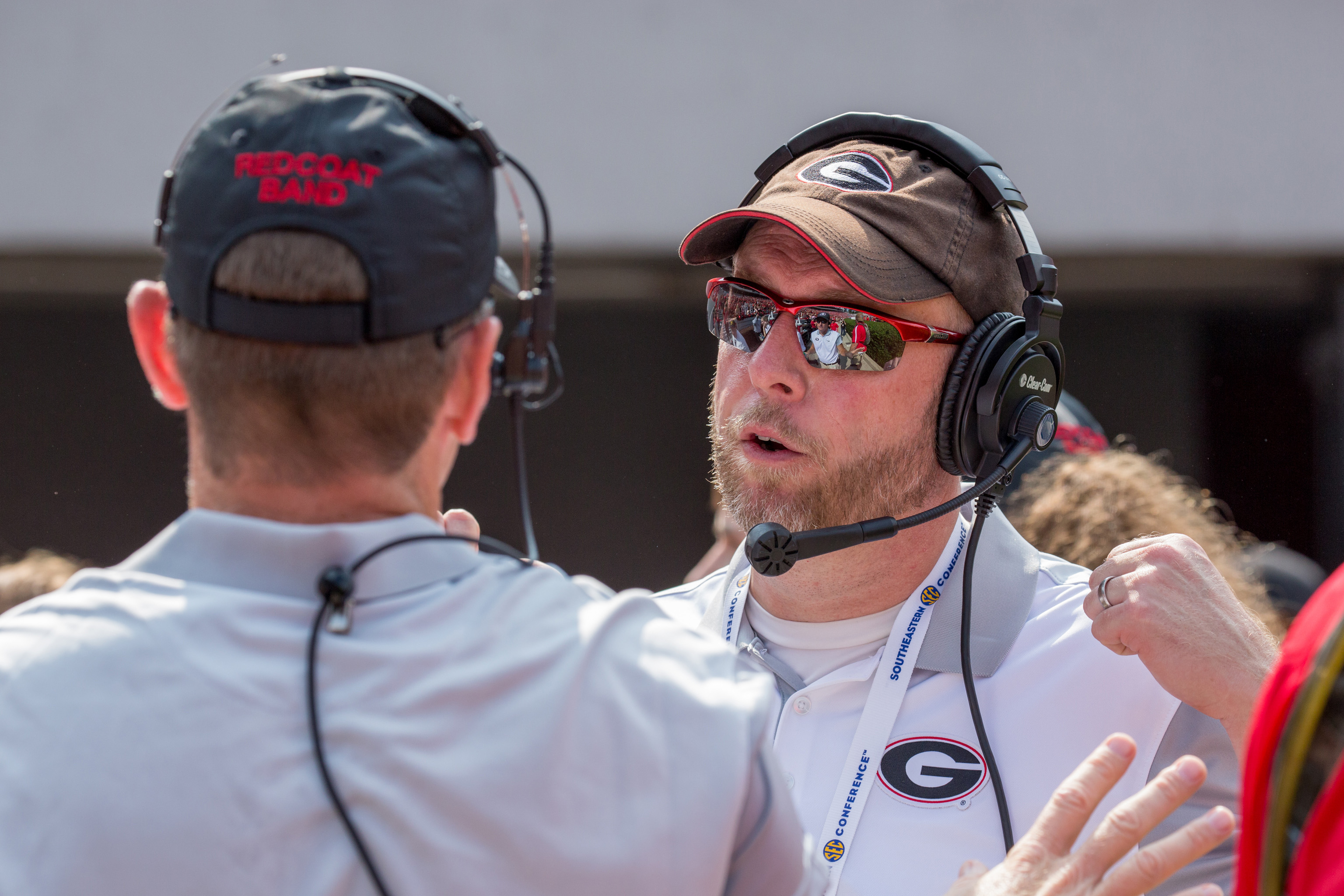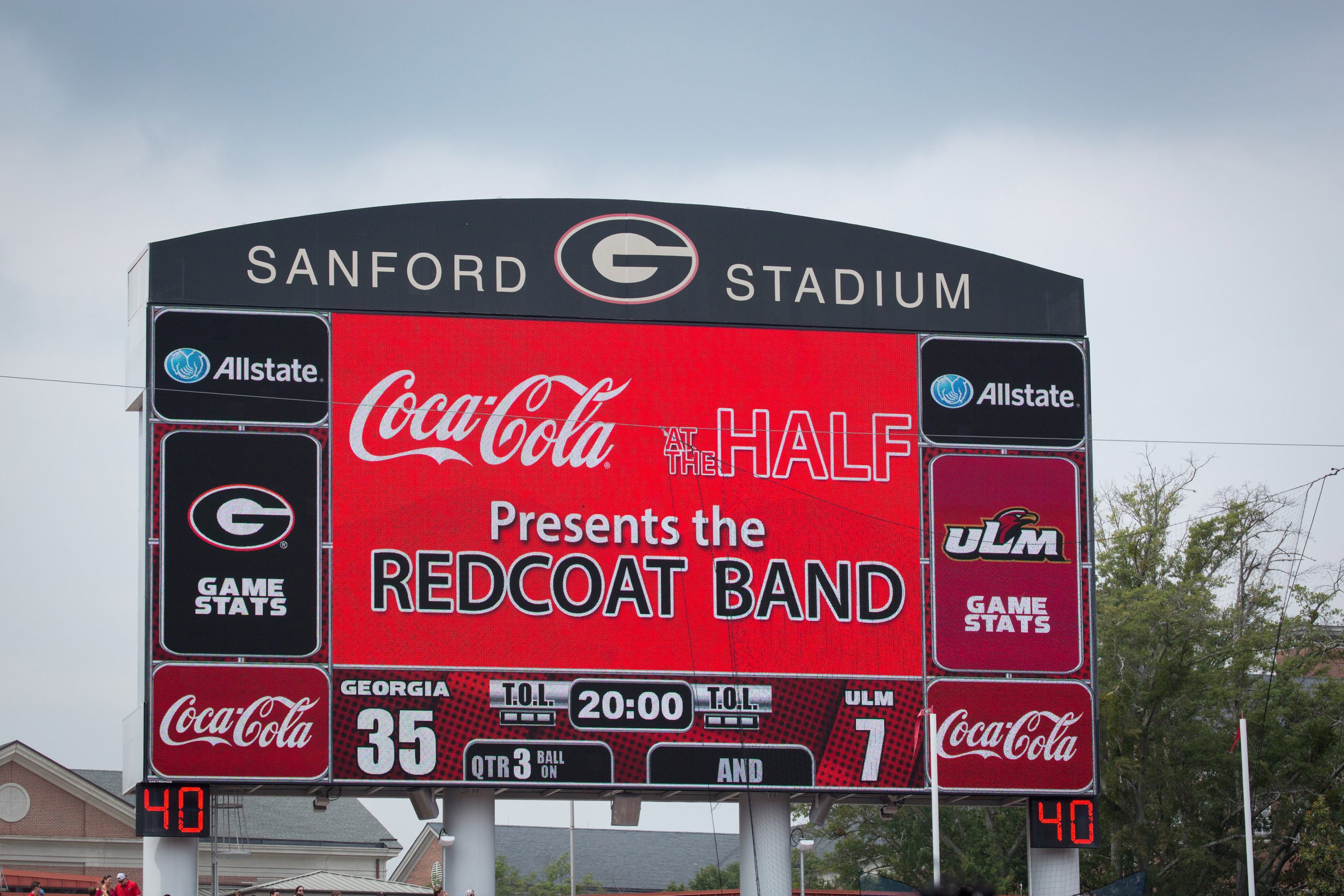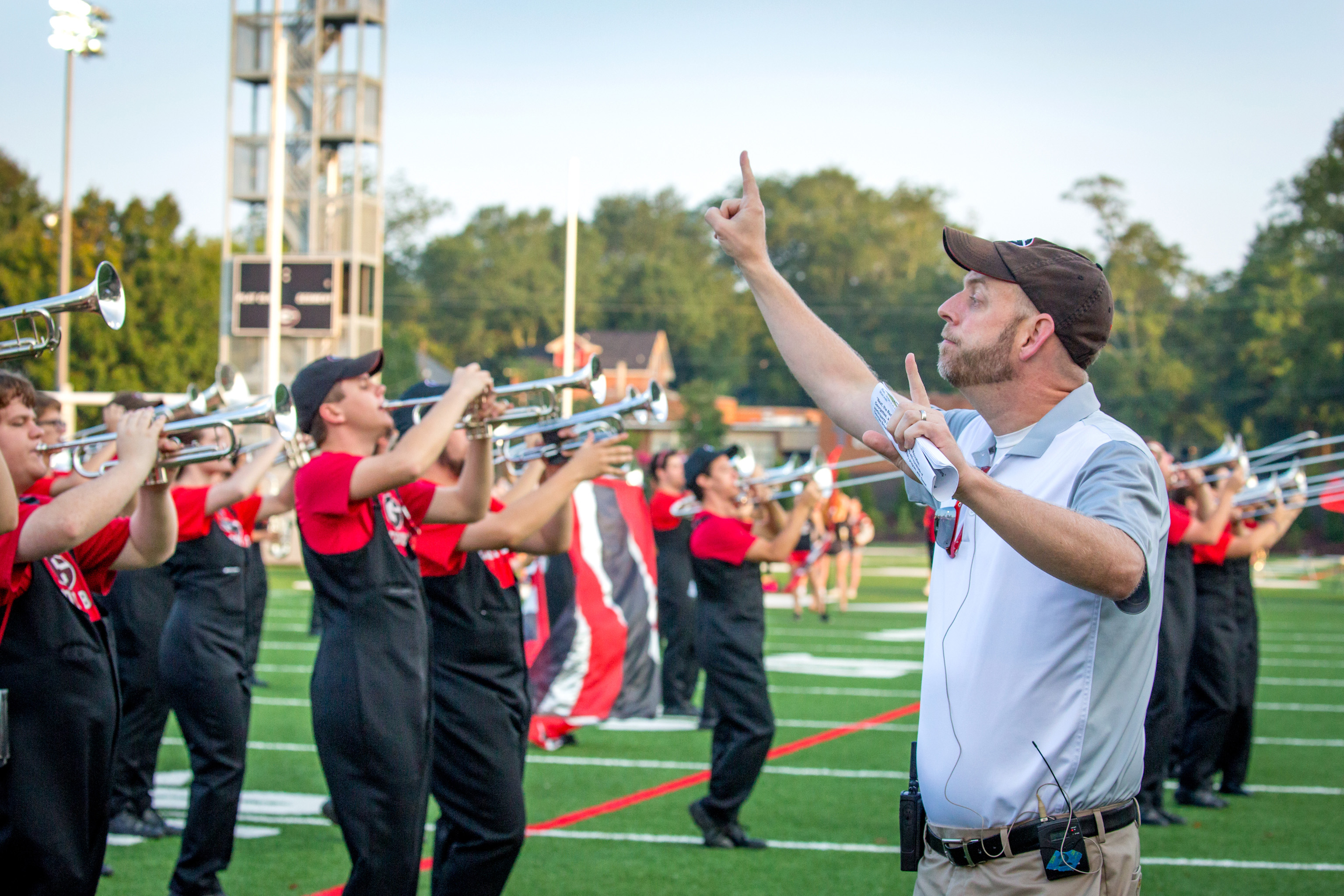Brett Bawcum
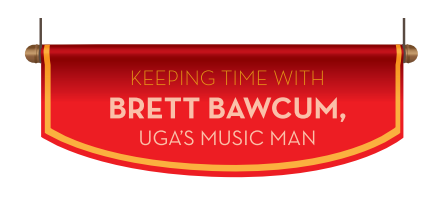
By: Cynthia Adams | Photos By: Nancy Evelyn
Most days, Brett Bawcum drops his three-year old daughter Evie at a Montessori school and commutes to the UGA campus from Jackson County in 30 minutes of welcome silence. Occasionally, Steely Dan may be playing. “Almost Gothic” was a recent favorite pop song. Or, it might be Jason Isbell. Another favorite, Miles Davis, is beloved but difficult to hear in the car.
By the time he parks his burgundy Honda CR-V, a 15-hour work day begins if there is a home game during football season. Soon after his arrival, a fleet of trucks arrive at Stegeman Coliseum. It is 6:45 a.m. And that’s for a late game. Early games require an hour earlier start. Bawcum is assistant director of bands and his legions await.
“There are 313 wind players, 45 percussionists, 62 auxiliary personnel, 12 properties crew members, and four drum majors. In addition to these performing members, the Redcoat Band has a staff of 35 (not all of whom attend every game), bringing the total number of personnel to 471,” says Bawcum.
Everything is planned with military precision. By 8:25, winds warm up. By 9:10, there is a half time review. By 9:55, there is a pre-game review. Rehearsals end at 10:30, and lunch is served. By 2:00 p.m., trucks arrive at Tate Student Center and unload. By 2:45, the Drum and Sousa Shows begin. The call time for all other Redcoats is at 3:00. At 3:35, they move into the Dawg Walk, followed by the Chant into the Stadium. The 5:15 Pre-Game Show precedes the 5:40 kick off. A Halftime Show at 7:00 is capped by the Post Game Show at 9:30.
It will be 10:00 p.m. before the Redcoats are dismissed. Sometime after that, Bawcum is back on the road to Jackson County, alone in his Honda after 15 hours spent with thousands and thousands of people.
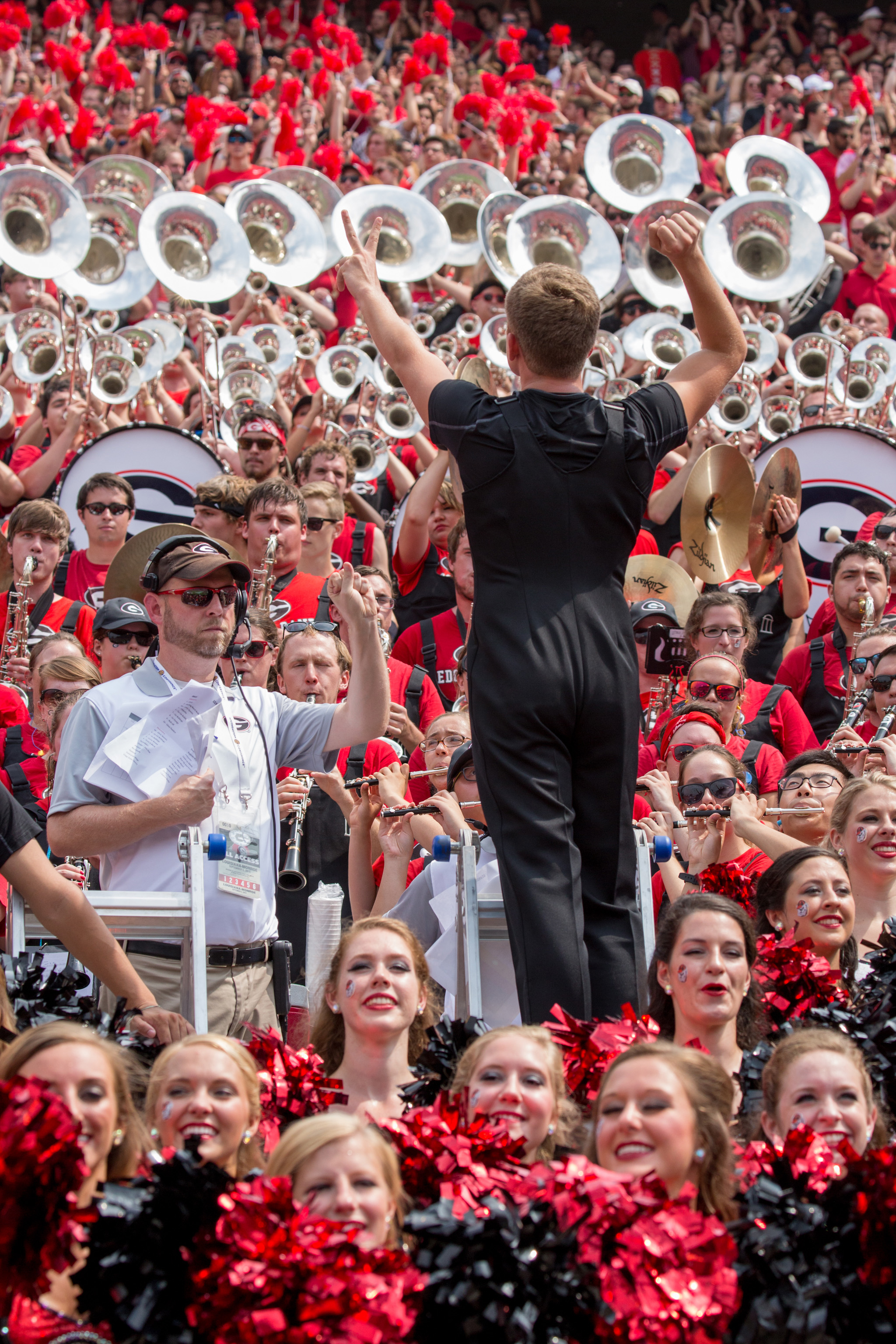
Brett Bawcum with Redcoat Band at UGA vs Lousiana (?) game
The instruments and uniforms are heavy, but imagine the challenge involved when it is 98 degrees of steaming heat, even in the shade. And as for steam, you don’t even want to know how rain complicates Bawcum’s planning. (But of course, there is every provision for rain.) There are 440 matching rain coats to organize; performers must have their cases; it is a whole other bother, and also smelly, Bawcum says. Think heat, the weight and mustiness of rain and sweat adding to a trifecta of sensory and physical overload for the uniformed musicians.
“The brass instruments typically fare okay in the rain,” he says. “The woodwinds have to be put away in case we get rain; almost any moisture severely damages those. Some of our percussion instruments can handle it.” So the woodwinds take their cases with them. One more thing to carry, he says.
“On occasion, we won’t perform on the field at pregame or halftime during or immediately after heavy rain,” he emails on the eve of a home game with rain forecasted. “That’s just to protect the playing surface. It’s honestly pretty disappointing to spend five hours preparing, only to find out that you’re not going to perform drill.”
Yet Bawcum is game for it all: affable, gifted, and likely tired. His toddler, Evie, sometimes joins him at rehearsals, as his job often requires him to be hundreds of miles away. The job—overseeing hundreds of musicians, designing routines, writing music and being compulsively involved in creative logistics and preparations—culminates in performances for thousands of observers—at least, if it doesn’t rain.
If you are a Dawg, you may have seen Bawcum, a calm figure presiding in a sea of tightly orchestrated performance at any of many sports events, including football, basketball, or volleyball.
Unlike some musicians, who play in dark bars for a handful of semi-conscious patrons, Bawcum must pass muster before an audience of 91,000 in Sanford Stadium. He must ride spectator’s emotions—which swell and expand in a way that is mercurial and dramatic—anticipating tension, jubilation, or defeat. And he must carry the audience along that journey with the sound of music to soothe or celebrate the emotions of the masses.

Here’s the skinny from Bawcum’s website: He is assistant director of Bands and associate director of athletic bands at the University of Georgia. He shares responsibility for design, instruction, and administration of the Redcoat Marching Band and serves as its primary drill writer. He also directs the Basketball and Volleyball Pep Bands, conducts the Concert Winds, serves as associate Conductor of the Symphonic Band, supervises student teachers, and teaches courses in a variety of areas including Instrumentation/Arranging and Marching Band Techniques.
Highlights include being a key member of the committee which developed the Dawg Walk. He arranges and composes for other bands throughout the U.S. and his work has been recorded on the Mark, Summitt, and Naxos labels.
As Bawcum slides into a booth for morning coffee at Walker’s on College Avenue in Athens, the question is this: How does Bawcum—also doctoral student, lecturer, and family man—do it? Not even Bawcum is sure except that it requires discipline squared. Concentration. He is working on relaxing more.
How many band members go on to be full-time musicians and how many end up directing bands themselves?
“I don’t have hard numbers. But about 25 percent of band members are music majors,” he answers. “That includes Music Performance, Music Education, Music Composition, Music Therapy, Music Theory, and the Bachelor of Arts in Music. My perception is that the vast majority of those who graduate with music degrees go on to careers in the field. Many of the region’s outstanding band directors (and music educators in general) are Redcoat alumni.”
Draining his cup, he checks the time. He mustn’t be late; Bawcum has a class to teach. He walks out with the perfect bearing and timing of a musician, one who must always lead with his chin up, come rain, shine, victory or defeat.
- Brett Bawcum with Redcoat Band at UGA vs Lousiana (?) game
- Redcoat Band in Sanford Stadium. Arch Society, Spike Spirt club
- Brett Bawcum at Redcoat rehearsal





